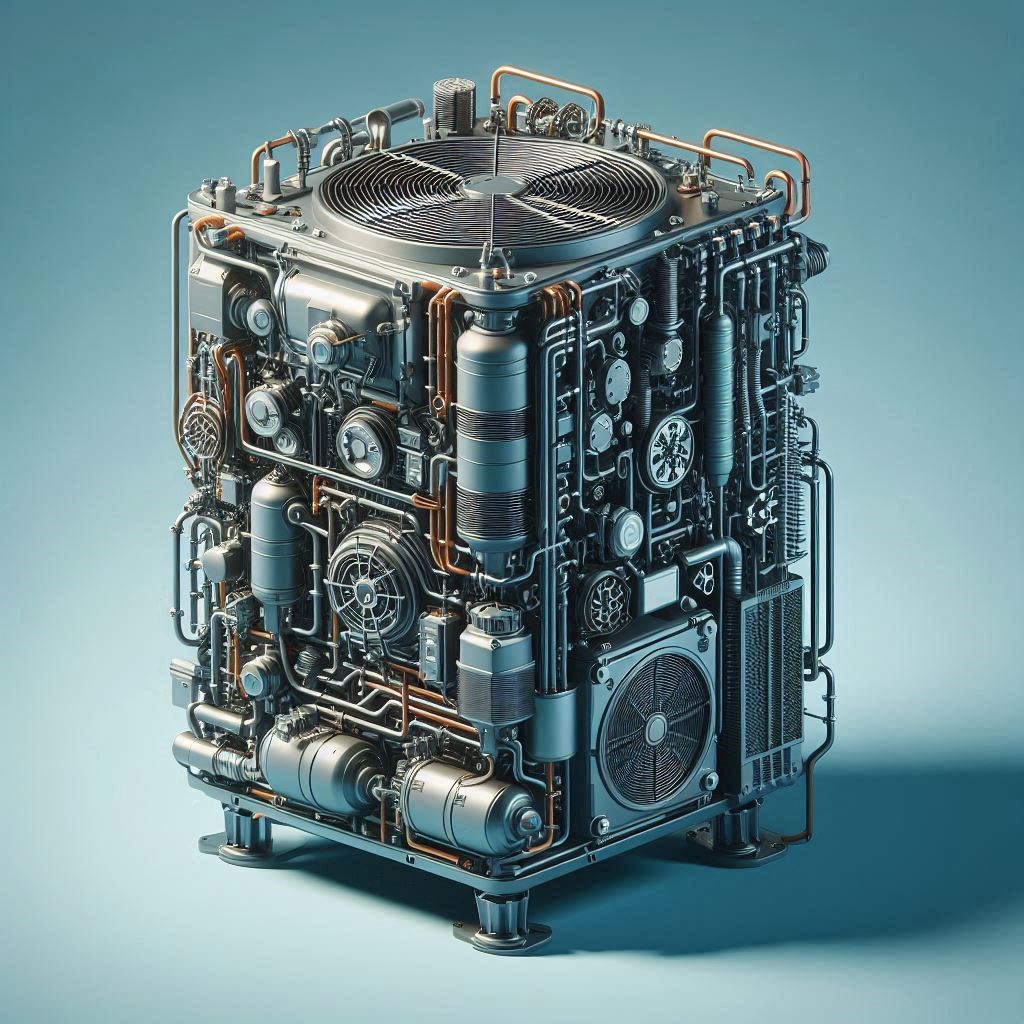The Worldwide Refrigeration Coolers Industry is undergoing a major transformation, driven by rising global demand for energy-efficient solutions and a growing emphasis on sustainability. As the need for cold storage and commercial cooling solutions expands across various sectors, from food and pharmaceuticals to retail and manufacturing, refrigeration technologies are evolving to meet these demands. The growing focus on energy efficiency, environmentally friendly refrigerants, and cost-effective operations is reshaping the industry, offering new opportunities for innovation and growth.
Rising Demand Across Key Sectors
One of the primary factors contributing to the growth of the worldwide refrigeration coolers industry is the expanding need for cold storage. With the global population continuing to grow and the demand for food products, pharmaceuticals, and temperature-sensitive goods on the rise, refrigeration systems are more essential than ever. In particular, the food industry—encompassing everything from perishable goods to packaged frozen items—is a key driver of this growth.
Moreover, the rise of e-commerce and online grocery delivery services has further accelerated the demand for refrigeration coolers. As more consumers rely on online shopping for groceries, there is an increasing need for automated and efficient refrigeration systems to preserve the freshness of products during transport and storage. In addition, the pharmaceutical industry, with the requirement for precise temperature control for sensitive medications and vaccines, is also fueling demand for specialized refrigeration solutions.
The global refrigeration coolers market is expected to be valued at USD 4.19 billion in 2024 and is projected to reach USD 5.74 billion by 2029; it is expected to grow at a CAGR of 6.5 % from 2024 to 2029.
The Push for Energy Efficiency and Sustainability
With the growing demand for refrigeration comes a pressing need for more energy-efficient technologies. Refrigeration systems are among the most energy-intensive operations in many industries, contributing to significant operational costs. The push for energy-efficient solutions is no longer just a trend—it’s a necessity for businesses looking to reduce expenses and minimize their environmental impact.
Energy-efficient refrigeration systems can significantly reduce energy consumption, leading to lower operational costs and a smaller carbon footprint. Innovations such as variable speed compressors, intelligent control systems, and high-efficiency insulation are helping companies optimize the performance of their refrigeration systems. By using less energy to achieve the same cooling results, businesses can not only save money but also comply with increasingly strict energy regulations in many regions.
In response to the growing demand for sustainability, many refrigeration manufacturers are developing and adopting eco-friendly refrigerants, which have lower global warming potential (GWP) and are less harmful to the environment. The shift towards these refrigerants is in alignment with global climate goals and the Kigali Amendment to the Montreal Protocol, which aims to phase out the use of hydrofluorocarbons (HFCs) in favor of safer alternatives.
Download PDF Brochure @ https://www.marketsandmarkets.com/pdfdownloadNew.asp?id=250448757

Technological Advancements Driving Growth
Innovation plays a central role in shaping the future of the refrigeration coolers industry. Technological advancements are improving not only the energy efficiency of refrigeration systems but also their ability to integrate with smart technology. The advent of IoT-enabled refrigeration systems allows for real-time monitoring and predictive maintenance, which can prevent breakdowns, extend the life of cooling units, and reduce downtime.
Smart refrigeration coolers equipped with sensors and cloud-based connectivity can track temperature fluctuations, adjust cooling output automatically, and provide detailed analytics on energy usage. This enables businesses to proactively address potential issues, optimize performance, and reduce energy consumption across their operations. Additionally, AI and machine learning algorithms are being integrated into refrigeration systems, enabling more intelligent control and better forecasting of energy needs.
Regulatory Pressures and Market Adaptation
Governments around the world are increasingly introducing stricter regulations regarding energy consumption and refrigerant use. As part of global efforts to mitigate climate change, the EU, USA, and many other countries are mandating the use of more efficient, low-impact refrigerants in commercial and industrial refrigeration systems.
For instance, in the European Union, the F-Gas Regulation sets out specific rules for reducing the use of high-GWP refrigerants in refrigeration systems. Similarly, the U.S. Environmental Protection Agency (EPA) has been promoting the use of natural refrigerants like CO2 and ammonia, which have a lower environmental impact. These regulations are pushing businesses to adopt newer, more sustainable technologies, which, in turn, is driving demand for innovative refrigeration coolers that comply with these requirements.

Opportunities for Innovation and Future Growth
The global refrigeration coolers industry is poised for continued growth, with companies across various sectors increasingly focused on enhancing energy efficiency and reducing their environmental footprint. Manufacturers are investing in research and development to create advanced refrigeration systems that not only provide optimal cooling but also offer significant savings in energy consumption and operating costs.
There is also significant potential in the development of modular refrigeration systems that can be customized to meet the unique needs of different industries. These systems can be scaled up or down depending on the requirements of the business, providing flexibility and efficiency. Additionally, alternative refrigerants, such as propane (R290) and hydrocarbon-based refrigerants, are gaining traction due to their low environmental impact and energy efficiency.
With the continued evolution of green technologies, energy-efficient innovations, and intelligent systems, the refrigeration coolers industry is set for a bright future. Businesses that prioritize sustainability and adapt to regulatory pressures will be better positioned to thrive in an increasingly competitive and eco-conscious marketplace.
The Worldwide Refrigeration Coolers Industry is at a critical juncture, with growing global demand for energy-efficient, sustainable solutions driving the market forward. As businesses and industries continue to prioritize cost savings, environmental responsibility, and regulatory compliance, the need for advanced, energy-efficient refrigeration systems will only increase. The continued development of smart refrigeration technologies and the adoption of eco-friendly refrigerants will ensure that the worldwide refrigeration coolers market remains a dynamic and evolving space for years to come.
The refrigeration coolers companies includes significant
- Tier I and II players such Johnsons Controls (Ireland),
- Lennox International (US),
- Lu-Ve Group(Italy),
- Rivacold (Italy),
- Kelvion Holding GmBH (Germany),
- Modine Manufacturing (US) and
- Copeland (US), among others.
Frequently Asked Questions (FAQ) related to the Worldwide Refrigeration Coolers Industry:
1. What are refrigeration coolers?
Refrigeration coolers are systems designed to maintain a low temperature to preserve goods such as food, beverages, pharmaceuticals, and other temperature-sensitive products. These systems use various cooling methods to keep items fresh, ranging from commercial refrigeration units to industrial-scale coolers.
2. What is driving the growth of the refrigeration coolers industry?
The growth of the refrigeration coolers industry is primarily driven by the following factors:
- Increased demand for cold storage due to the rise in global food and pharmaceutical industries.
- The expansion of e-commerce, particularly for perishable goods.
- The need for energy-efficient and sustainable cooling solutions due to rising energy costs and stricter environmental regulations.
3. How are refrigeration coolers becoming more energy-efficient?
Refrigeration systems are becoming more energy-efficient through:
- Variable speed compressors that adjust cooling based on demand.
- The use of high-efficiency insulation to reduce energy loss.
- Integration with smart technologies such as IoT, which enables real-time monitoring and automated adjustments.
- Adoption of eco-friendly refrigerants that have lower environmental impacts.
4. What are the eco-friendly refrigerants used in modern coolers?
Eco-friendly refrigerants are designed to reduce the environmental impact of refrigeration systems. Some of the commonly used refrigerants include:
- R-290 (Propane): A natural refrigerant with low global warming potential (GWP).
- R-744 (CO2): An environmentally safe option for refrigeration with no ozone-depleting properties.
- R-600a (Isobutane): A low-GWP refrigerant used in domestic and commercial coolers.
5. How are smart technologies changing the refrigeration coolers market?
Smart technologies such as IoT-enabled systems and AI-driven algorithms are transforming the refrigeration coolers market by providing:
- Remote monitoring: Users can access and control their refrigeration systems via smartphones or computers.
- Predictive maintenance: Sensors detect issues before they become critical, minimizing downtime and repair costs.
- Energy optimization: Smart systems automatically adjust settings to ensure energy efficiency and reduce costs.
6. What industries benefit from refrigeration coolers?
Refrigeration coolers serve a wide range of industries, including:
- Food and beverage: For preserving perishable goods, keeping food fresh, and preventing spoilage.
- Pharmaceuticals: To store temperature-sensitive medications and vaccines.
- Retail: For displaying cold items in supermarkets, convenience stores, and restaurants.
- Logistics and supply chain: For transporting goods at controlled temperatures.
7. What are the regulatory trends affecting the refrigeration coolers industry?
Government regulations around energy consumption and refrigerant use are driving innovation in the refrigeration coolers industry. Key regulations include:
- The Montreal Protocol and Kigali Amendment which phase out high-GWP refrigerants like HFCs and push for eco-friendly alternatives.
- Energy efficiency standards in the European Union, USA, and other regions encouraging companies to use high-performance, low-energy systems.
8. What are the challenges faced by the refrigeration coolers industry?
Some of the challenges the industry faces include:
- High initial investment for energy-efficient and eco-friendly systems.
- Ongoing maintenance costs and the need for proper servicing of refrigeration systems to ensure they operate efficiently.
- Regulatory compliance as governments enforce stricter energy and refrigerant regulations.
- Adapting to smart technologies while ensuring systems are accessible to all types of businesses, from large corporations to small enterprises.
9. What are the future trends in the refrigeration coolers market?
The future of the refrigeration coolers market includes:
- Increased integration of smart technologies such as AI and IoT to enhance system performance and reliability.
- Continued development of eco-friendly refrigerants and sustainable cooling solutions.
- More modular and scalable refrigeration systems to accommodate various business sizes and needs.
- Automated and remote-controlled refrigeration systems that improve energy efficiency and reduce operational costs.
10. How can businesses choose the right refrigeration cooler system?
When selecting a refrigeration cooler, businesses should consider:
- Energy efficiency: Choose models with high energy ratings and low operational costs.
- Size and capacity: Ensure the system fits the storage needs of your products.
- Type of refrigerant: Consider using systems that utilize low-GWP, eco-friendly refrigerants.
- Smart features: Look for systems that offer real-time monitoring, remote control, and predictive maintenance.
- Compliance: Ensure the system meets local environmental regulations and energy efficiency standards.
